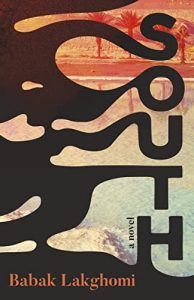Ian Mond Reviews South by Babak Lakghomi
 South, Babak Lakghomi (Rare Machines 978-1-45975-081-4, $21.99, 200pp, tp) September 2023.
South, Babak Lakghomi (Rare Machines 978-1-45975-081-4, $21.99, 200pp, tp) September 2023.
In a brief introduction to South, Babak Lakghomi tells us that he began writing his debut in 2018 during the Trump Presidency and the anti-Government riots in his birth country of Iran. The book, he says, ‘‘was born out of such vital concerns of our time—the meaning of truth, environmental perils, surveillance, and censorship.’’ What’s impressive about this isn’t Lakghomi’s willingness to tackle such weighty themes with his first novel (having previously published a novella, Floating Notes) but that he’s able to pack it all into such a short book (clocking in at less than forty-five thousand words). His portrait of a totalitarian nation-state, where truth is fungible and selfhood is a luxury, is as surreal as it is nightmarish.
South’s protagonist is B, a journalist sent by his Editor to the titular South to confirm rumours of labour strikes on the country’s offshore oil rigs. For B, it’s an opportunity to reset. His last essay, ‘‘about the extinction of painted storks,’’ was never published, while his relationship with Tara – the only person worthy of a name rather than a letter or designation – is on the verge of breaking, primarily due to B’s excessive drinking. He also intends to spend time on the rig working on a biography of his activist father to ‘‘find out who he was, to understand why he’d left and stopped communicating with us.’’ But everything goes wrong the moment B arrives at the oil rig. He’s handed a laptop with no access to email (they have to be printed); the workers refuse to be interviewed; and the publisher’s edits of the first two chapters of B’s book have been heavily censored, removing any mention that his father was laid off from his job. It’s the Assistant Cook who opens up to B, confessing to the poor conditions on the rig, including a spate of suicides and ‘‘worse things [that] have happened on other rigs.’’ The following day the Cook vanishes, and shortly after, a worker lights himself on fire. Isolated and afraid and now a target of the State, B struggles to keep hold of his sense of self, his memories of Tara, his father, and even his infidelities.
Lakghomi makes the smart move of never naming the country where South takes place. He recognises that totalitarianism is agnostic of ideology, of culture, of geography. But he makes the even smarter decision to tell the story in first person. Trapped in B’s head, we’re privy to feelings of guilt – his betrayal of Tara, not just the drinking but an affair – and conflicted emotions about his father: pride that his father was pivotal to connecting multiple unions but bewildered by his sudden, unexplained disappearance. As B’s environment starts closing in on him, his thoughts grow increasingly terse and brittle, unable to comprehend what he’s done to have his past and present stripped away. It’s claustrophobic stuff, not just the enclosed environment of the oil rig (though that certainly adds to the atmosphere) but the erasure of B’s identity: ‘‘every day there were more holes in my memory.’’ And because the novel is so short, Lakghomi can sustain this effect, making the reading experience all the more unsettling.
Where South also differs from your typical totalitarian fare (1984, The Handmaids Tale, Fahrenheit 451, and even the current crop of dystopian novels) is the depiction of fierce clashes between the state and its citizenry in the novel’s final third. Lakghomi, as he foreshadows in the introduction, draws on the 2018 Iranian protests, the largest demonstrations in the country since 2009. In showing the violence, the anarchy, the anger, Lakghomi reminds us that totalitarian, theocratic, or authoritarian regimes aren’t inherently all-powerful, all-seeing, and all-controlling; there is always the potential to fight back. And yet, Lakghomi understands that these protests rarely lead to meaningful change, that totalitarianism, once bedded in, is hard to shake, and that even if those in power change, some version of the status quo will reassert itself. It’s this sad truth that leaves a lasting impression on B, but also on the reader.
Ian Mond loves to talk about books. For eight years he co-hosted a book podcast, The Writer and the Critic, with Kirstyn McDermott. Recently he has revived his blog, The Hysterical Hamster, and is again posting mostly vulgar reviews on an eclectic range of literary and genre novels. You can also follow Ian on Twitter (@Mondyboy) or contact him at mondyboy74@gmail.com.
This review and more like it in the September 2023 issue of Locus.
 While you are here, please take a moment to support Locus with a one-time or recurring donation. We rely on reader donations to keep the magazine and site going, and would like to keep the site paywall free, but WE NEED YOUR FINANCIAL SUPPORT to continue quality coverage of the science fiction and fantasy field.
While you are here, please take a moment to support Locus with a one-time or recurring donation. We rely on reader donations to keep the magazine and site going, and would like to keep the site paywall free, but WE NEED YOUR FINANCIAL SUPPORT to continue quality coverage of the science fiction and fantasy field.
©Locus Magazine. Copyrighted material may not be republished without permission of LSFF.






